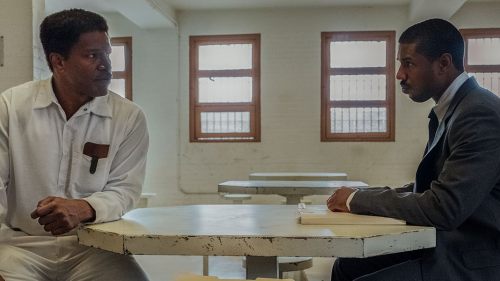JUST MERCY Review: Defendants’ Rights On Trial
If you’ll indulge me, I think it’s important that you know where I come from in reviewing a film like Just Mercy. When I’m not writing articles like this one, I’m an attorney. My passion has always been in criminal justice, particularly for the rights of defendants against a system that holds every advantage against them, especially if they are poor or non-white. We live in a culture that values punishment over rehabilitation, gives preferential treatment based on subconscious but explicit biases, and treats the prison system as an industry for labor that encourages repeat offenders. This is something I feel very passionately about, so I want you to recognize that when I say Just Mercy is an important film, I don’t say that because I think it’s one of the best films of the year (it’s not), or because I think the economic success of this film would be any sort of indication of how our culture is improving (it wouldn’t be). When I say Just Mercy is an important film, I mean that it effectively and dramatically makes a point about a pervasive institutional issue that affects every state that still practices the death penalty, and any effective increase in the awareness of that issue is a cause worth championing.
Just Mercy is the story of Bryan Stevenson (Michael B. Jordan), who graduated from Harvard and moved to Alabama in the early 1990s to found the Equal Justice Initiative, a non-profit organization with the sole purpose of providing legal counsel to death row inmates who cannot afford an attorney. Though the film offers a sense of how Stevenson’s organization grew from his assistant’s (Brie Larson) living room to a full-fledged multi-attorney practice, the main narrative revolves around Walter “Ronnie D.” McMillian (Jamie Foxx), a man on death row for the murder of a white woman a full county away from his home. Stevenson’s cursory investigation of Ronnie D.’s case shows an extreme lack of evidence on which to base a conviction, and further examination shows that the entire prosecution hinged on the questionable testimony of one white convict (Tim Blake Nelson). However, the district attorney (Rafe Spall) is committed to upholding the conviction in spite of all evidence, so Stevenson needs to fight in order to save the life of his client.
The trade-off for grounding the Big Issue legal thriller in a real-life case is that you lose the kind of exaggerated bombast one might expect from a John Grisham adaptation, even as you gain humanity in the characters. The result is a somewhat muted story that hits familiar beats, yet doesn't really emphasize theatrics in their expression. The film adheres to pretty standard legal thriller tropes, chronicling how Stevenson builds his case and the forces of institutional and community racism that stand in his way; the second act treats a substantial legal defeat as a morale-destroying turning point; and the third act climaxes on a heroic courtroom speech that does less to argue the case than convey the film’s morality to the audience. It’s all pretty standard stuff that remains relatively true to the history of the events it portrays and adheres to the maxim that a formula that isn't broken doesn’t need to be fixed.
Where Just Mercy excels, though, is in how it conveys the dire importance of the issues it presents. Michael B. Jordan plays Stevenson as an idealistic young man whose convictions are tested by the overwhelming forces he wishes to combat, which not only threaten his clients but leave him vulnerable as a black man in the American Deep South. There’s strength in Stevenson’s convictions, but also a perpetual vulnerability as he grows to love and care about people who might one day be killed despite his best efforts to prevent it, which Jordan portrays with tenderness and grace. Foxx, meanwhile, portrays Ronnie D. as a hopeless man in desperate need of a lifeline, a family man who needs a compassionate voice to remind him not to give up on life. This makes for a compelling counterpoint to Stevenson's youthful optimism, since Ronnie D. knows firsthand what it's like to be betrayed by public defenders who didn’t care if he was innocent and a police system that only cares about the perceived safety of its white community, regardless of whether an actual murderer is still on the loose. And though the film is about giving Ronnie D. that chance of living his life again, director Destin Daniel Cretton doesn’t pull any punches when conveying the severity of what he and other death row inmates are up against. Just Mercy shows you its stakes with one of the most harrowing and sympathetic execution scenes ever put to film, and it doesn’t even need to directly show the killing for the impact of the event to leave lasting psychic scars.
An end card tells us that one in nine death row inmates are later found innocent, which is a disgustingly high rate of error for a system that purports to provide fairness and justice. Just Mercy uses a tried and true template to convey the human cost of that statistic, and though that doesn’t make the film transcendent in pure cinematic terms, it makes the film vital in our understanding of compassion, even against those whom we believe criminal. It’s that kind of appeal to humanity that made me want to go to law school in the first place, and it’s films like this that hopefully can change enough minds to affect real change.
Just Mercy opens in select theaters on December 25, 2019 before expanding nationwide on January 10, 2020.



